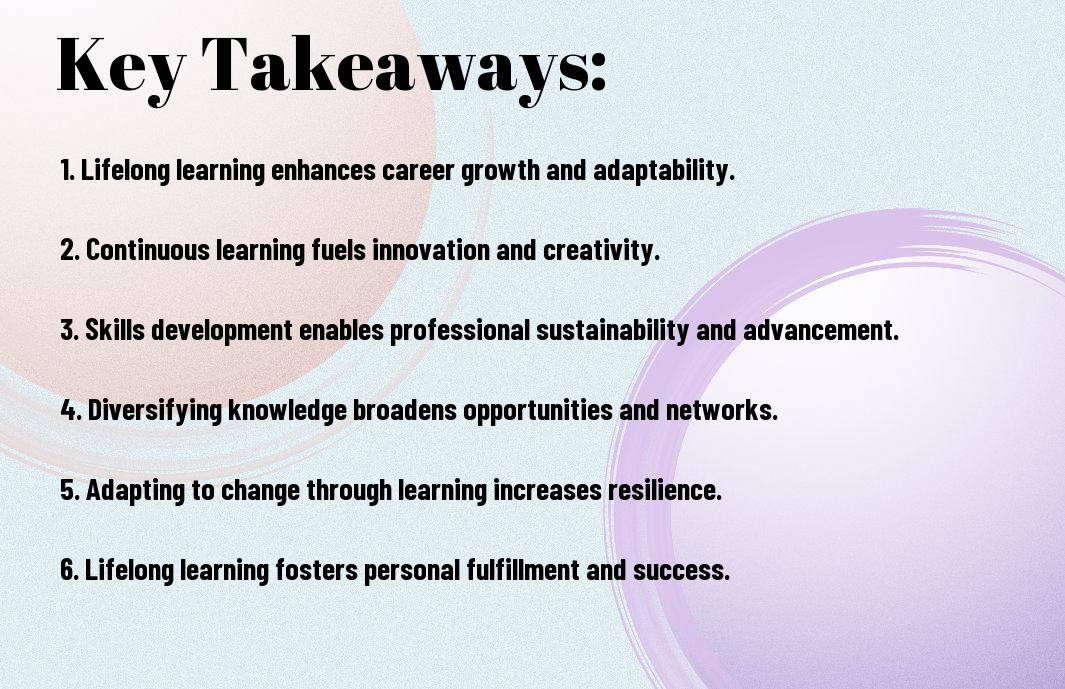There’s no denying the importance of lifelong learning in today’s fast-paced and ever-evolving job market. With technology advancing rapidly and new skills becoming necessary for career growth, professionals who embrace continuous learning gain a significant competitive edge. Whether you’re looking to advance in your current role, switch careers, or simply stay relevant in your industry, investing in your professional development through lifelong learning is crucial.

Key Takeaways:
- Lifelong learning is necessary: Embracing continuous learning throughout your career is crucial for staying relevant in today’s rapidly changing job market.
- Build a growth mindset: Cultivate a mindset that welcomes challenges and sees failures as opportunities for growth and learning.
- Develop a diverse skill set: Acquire a range of skills beyond your current job requirements to adapt to evolving job roles.
- Stay curious and adaptable: Be open to new ideas, technologies, and ways of working to remain flexible and innovative.
- Network and collaborate: Engage with professionals from different backgrounds to gain fresh perspectives and insights for personal and professional growth.
- Seek feedback and reflect: Regularly seek feedback to identify areas for improvement and reflect on your learning journey to track progress.
- Set learning goals: Establish clear, achievable learning goals to stay motivated and focused on advancing your skills and career.

The Pillars of Lifelong Learning
The Unleashing the Power of Continuous Learning: How N… is a testament to the transformative impact of lifelong learning. In the pursuit of continuous growth and development, certain pillars uphold the structure of lifelong learning, ensuring that individuals propel their careers to new heights.
Curiosity and the Will to Learn
Curiosity is the spark that ignites the flame of learning. It is the insatiable thirst for knowledge that drives individuals to seek out new information, ideas, and experiences. When coupled with a strong will to learn, curiosity becomes a powerful force that fuels personal and professional growth. By fostering a curious mindset, individuals open themselves up to endless possibilities and opportunities for learning.
Adaptability to Technological Changes
The Pillars of lifelong learning also encompass adaptability to technological changes. In today’s rapidly evolving digital landscape, the ability to embrace new technologies and adapt to changing environments is crucial for staying relevant in the workforce. For instance, individuals who regularly update their skills and knowledge to keep pace with technological advancements are better equipped to navigate the challenges of the modern workplace and seize new opportunities for growth and development.
Commitment to Personal Growth
The commitment to personal growth is another imperative pillar of lifelong learning. It involves a dedication to self-improvement, continuous development, and the pursuit of excellence. By setting goals, seeking out new learning experiences, and pushing beyond comfort zones, individuals can unlock their full potential and achieve greater success in their careers and personal lives.

Essential Skills for the Lifelong Learner
Not Future-Proof Your Career: The Lifelong Learning Advantage
Critical Thinking and Problem-Solving
To excel in today’s fast-paced and ever-evolving work environment, individuals must possess the ability to think critically and problem-solve effectively. Critical thinking involves analyzing information objectively and making well-informed decisions, while problem-solving requires the capacity to identify, evaluate, and implement solutions to complex challenges. Embracing these skills allows lifelong learners to adapt to new situations, navigate obstacles, and drive innovation within their careers.
Effective Communication Techniques
Skills in effective communication are crucial for the lifelong learner to succeed in various professional settings. Clear and concise communication fosters collaboration, boosts productivity, and enhances team dynamics. Additionally, mastering techniques such as active listening, clarity in expression, and empathy can elevate an individual’s ability to convey ideas, receive feedback, and build strong relationships within the workplace.
Effective communication is the cornerstone of successful interactions both in and out of the workplace. It enables individuals to articulate their thoughts clearly, understand others’ perspectives, and establish meaningful connections that foster professional growth and development.
Time Management for Continuous Education
Essential to the journey of a lifelong learner is the skill of time management. Balancing work, personal commitments, and ongoing education requires meticulous planning, prioritization, and organization. Utilizing tools and strategies to optimize time usage, setting achievable goals, and maintaining a disciplined approach to learning are fundamental in sustaining continuous personal and professional development.
Any individual committed to lifelong learning must cultivate effective time management skills to juggle multiple responsibilities, stay focused on learning objectives, and maximize productivity. Embracing time management techniques empowers learners to allocate time efficiently, overcome procrastination, and stay on track towards their educational and career aspirations.
Education
Emotional intelligence plays a significant role in creating a supportive and engaging learning environment. Understanding and managing one’s emotions, as well as being attuned to the feelings of others, enhances interpersonal relationships, resolves conflicts constructively, and promotes a positive learning atmosphere. Lifelong learners who cultivate emotional intelligence are better equipped to collaborate effectively, adapt to diverse perspectives, and thrive in a dynamic learning environment.
Education regarding emotional intelligence elevates the learning experience by fostering self-awareness, empathy, and social skills. Individuals who prioritize emotional intelligence in their educational pursuits demonstrate resilience, empathy, and the ability to navigate challenges with a positive mindset, contributing to their overall growth and success.
Management of these vital skills positions individuals for continued success in their educational and professional endeavors. By honing critical thinking, effective communication, time management, and emotional intelligence, lifelong learners can navigate complexities, foster growth, and propel their careers to new heights.
Building Your Personal Learning Plan
Now, as you launch on the journey of lifelong learning, it’s important to have a structured plan in place to guide your efforts. For a comprehensive guide on how to develop your personal learning plan, check out The Power of Lifelong Learning: How Continuous Skill Development Can Boost Your Career.
Identifying Career Objectives
Plan. To start building your personal learning plan, begin by identifying your long-term career objectives. What are your goals? Where do you see yourself in the next 5, 10, or 15 years? Understanding your career aspirations will help you tailor your learning efforts towards achieving them.
Setting Achievable Learning Goals
Building. Setting achievable learning goals is crucial in ensuring your progress and development. These goals should be specific, measurable, attainable, relevant, and time-bound (SMART). By breaking down your long-term objectives into smaller, manageable milestones, you can track your progress and stay motivated throughout your learning journey.
The key to success in setting achievable learning goals lies in being realistic and consistent. It’s important to challenge yourself without overwhelming your capabilities. By setting clear objectives and establishing a timeline for accomplishing them, you can create a roadmap for your growth and skill development.
Mapping Out Your Skills Development Path
Building. Once you have defined your career objectives and set achievable learning goals, the next step is to map out your skills development path. This involves identifying the key skills and knowledge areas that are important for your desired career growth. By understanding the skills gaps you need to fill, you can prioritize your learning efforts and focus on areas that will have the greatest impact on your professional development.
Learning. It’s crucial to continuously assess your progress and adjust your learning plan as needed. By regularly reviewing your goals and tracking your development, you can stay on course towards achieving your career objectives. Recall, lifelong learning is a journey, and by actively engaging in skill development, you can propel your career to new heights.
Overcoming Common Challenges in Lifelong Learning
Your commitment to lifelong learning is a powerful tool that can propel your career to new heights. However, along this journey, you may encounter common challenges that can hinder your progress. It’s vital to address these obstacles head-on to ensure your success in acquiring new skills and knowledge.
Staying Motivated and Disciplined
One of the most common challenges in lifelong learning is staying motivated and disciplined. With busy schedules and competing priorities, it can be challenging to carve out time for learning. To overcome this challenge, set specific goals for your learning, create a realistic schedule, and hold yourself accountable. Celebrate small wins along the way to stay motivated and focused on your learning journey.
Navigating Information Overload
Navigating information overload is another common challenge in lifelong learning. With the abundance of resources available, it can be overwhelming to find the most relevant and reliable information. To tackle this challenge, focus on quality over quantity. Use credible sources, such as reputable online courses, books, and industry experts, to guide your learning. Develop critical thinking skills to evaluate information effectively and filter out the noise.
To balance learning with other life responsibilities doesn’t have to be an insurmountable challenge. With proper time management and prioritization, you can integrate learning into your daily routine effectively. Utilize tools like calendars, to-do lists, and setting boundaries to ensure that you allocate dedicated time for learning. Embrace the mindset that learning is a continuous process that can enhance your personal and professional growth.
Balancing Learning with Other Life Responsibilities
Understanding how to balance learning with other life responsibilities is crucial for long-term success. Prioritize tasks based on their importance and urgency, delegate responsibilities when necessary, and practice self-care to avoid burnout. Remember that investing in your learning journey is an investment in yourself and your future. By proactively addressing these common challenges, you can harness the power of lifelong learning to propel your career forward.

Leveraging Technology for Lifelong Learning
All professionals understand the importance of continuous learning to stay relevant in a rapidly evolving job market. Technology has revolutionized the way we acquire knowledge and skills, making lifelong learning more accessible and convenient than ever. Whether you’re looking to upskill for a promotion or pivot to a new career, leveraging technology should be a key component of your learning strategy.
Online Courses and E-learning Platforms
To maximize your learning potential, consider enrolling in online courses and leveraging e-learning platforms. Websites like Coursera, Udemy, and LinkedIn Learning offer a wide range of courses taught by industry experts. These platforms allow you to learn at your own pace, on your own schedule, from anywhere in the world.
Harnessing Social Media for Professional Development
For professionals seeking to expand their networks and stay updated on industry trends, social media can be a powerful tool for professional development. Platforms like LinkedIn, Twitter, and industry-specific forums provide opportunities to connect with like-minded individuals, participate in discussions, and access valuable insights.
By following influencers and thought leaders in your field, you can gain valuable knowledge and stay ahead of the curve. Additionally, participating in relevant LinkedIn groups and Twitter chats can help you engage with peers and exchange ideas.
The key to harnessing social media for professional development is to strike a balance between consuming content and actively engaging with your network. While it’s important to stay informed, actively participating in discussions and sharing your insights can help you showcase your expertise and build credibility within your industry.
Mobile Apps and Tools to Facilitate Continuous Learning
The proliferation of mobile apps has made continuous learning more convenient and accessible than ever before. Apps like Duolingo for language learning, TED for thought-provoking talks, and Khan Academy for academic subjects offer a wealth of knowledge at your fingertips.
With features like gamification, personalized learning paths, and bite-sized lessons, these mobile apps make learning engaging and effective. By incorporating these tools into your daily routine, you can transform your idle moments into opportunities for growth and skill development.
Continuous learning through mobile apps not only enhances your knowledge and skills but also fosters a growth mindset that is crucial for success in today’s fast-paced world. Embrace these tools as companions in your lifelong learning journey, and watch your career soar to new heights.
Networking and Collaborative Learning
Once again, we are reminded of the power of networking and collaborative learning in propelling our careers to new heights. These two pillars of lifelong learning play a crucial role in expanding our knowledge, skills, and opportunities in today’s interconnected world.
Forming Peer Learning Groups
Learning in peer groups is a valuable way to gather diverse perspectives and insights on various subjects. By collaborating with peers who possess different skills and experiences, individuals can deepen their understanding of concepts and foster a culture of continuous learning.
Engaging with Professional Communities
Groups within professional communities provide a platform for individuals to connect with like-minded professionals, share knowledge, and stay updated on industry trends. Engaging with these communities can open doors to new opportunities, partnerships, and collaborations that can enhance one’s career trajectory.
The exchange of ideas and best practices within professional communities can lead to innovative solutions and new perspectives that drive individual and collective success.
Mentorship Opportunities and Their Impact
Mentorship is a powerful learning tool that offers individuals guidance, support, and wisdom from seasoned professionals in their field. Mentorship opportunities provide a unique chance to learn from someone who has already walked the path, gaining valuable insights and advice along the way.
Through mentorship, individuals can accelerate their growth, expand their networks, and gain valuable insights that can shape their career decisions and aspirations.
This chapter underscores the importance of networking, collaborative learning, and mentorship in fostering professional development and accelerating career growth. Embracing these opportunities can lead to new connections, innovative ideas, and personal growth that can propel individuals to new heights in their respective fields.
Future Trends in Lifelong Learning
The Rise of Micro-Credentials
Future trends in lifelong learning point towards the rise of micro-credentials as a valuable asset to enhance one’s skillset. Micro-credentials are short, specialized courses designed to target specific skills or knowledge areas. These credentials are gaining popularity as they offer a more flexible and cost-effective way of upskilling or reskilling compared to traditional degrees.
Predicting the Skills of the Future
With the rapid advancements in technology and automation, predicting the skills that will be in demand in the future becomes crucial for individuals looking to stay relevant in the job market. It is crucial to identify and develop skills such as critical thinking, adaptability, digital literacy, and emotional intelligence to thrive in an ever-evolving workforce.
Rise
The Role of Employers in Encouraging Lifelong Learning
Employers play a significant role in encouraging lifelong learning among their employees. They can support their workforce by providing opportunities for continuous learning, whether through internal training programs, mentorship initiatives, or financial assistance for further education. By investing in the development of their employees’ skills, organizations can cultivate a more knowledgeable and adaptable workforce.
MicroCredentials
It is important for employers to recognize the value of micro-credentials and incorporate them into their talent development strategies. Micro-credentials can be a quick and efficient way for employees to acquire specialized skills that are directly applicable to their roles, allowing them to stay competitive in an ever-changing job market.
Conclusion
Conclusively, lifelong learning is a vital component for propelling your career to new heights. By continuously acquiring new skills and knowledge, you can adapt to the ever-evolving demands of the workforce and stay ahead of the competition. Lifelong learning not only enhances your expertise but also boosts your confidence, creativity, and problem-solving abilities, making you a valuable asset in any industry.
Investing in your personal and professional development through lifelong learning can open up new opportunities, expand your network, and lead to career advancement. Whether through formal education, online courses, workshops, or self-directed learning, the power of lifelong learning can truly transform your career trajectory and set you on a path towards success and fulfillment.
FAQ
Q: Why is lifelong learning important for career growth?
A: Lifelong learning is crucial for career growth because it helps individuals stay relevant in a rapidly changing job market, adapt to new technologies, and acquire new skills that are in demand.
Q: What are some key skills that can propel my career to new heights?
A: Skills such as communication, leadership, critical thinking, problem-solving, and adaptability are crucial for career advancement and can help you excel in any industry.
Q: How can lifelong learning benefit my professional development?
A: Lifelong learning can enhance your professional development by keeping you updated on industry trends, expanding your knowledge base, and increasing your expertise in your field.
Q: What are some effective ways to engage in lifelong learning?
A: Engage in lifelong learning by taking online courses, attending workshops and seminars, reading industry publications, seeking mentorship, and networking with professionals in your field.
Q: How can I balance lifelong learning with my current job responsibilities?
A: You can balance lifelong learning with your job responsibilities by setting aside dedicated time for learning, prioritizing tasks, delegating when necessary, and creating a learning schedule that works for you.
Q: What are the benefits of continuous self-improvement through lifelong learning?
A: Continuous self-improvement through lifelong learning can lead to increased job satisfaction, higher earning potential, greater career advancement opportunities, and personal growth.
Q: How can I measure the impact of lifelong learning on my career success?
A: You can measure the impact of lifelong learning on your career success by tracking your professional growth, receiving feedback from colleagues and supervisors, achieving career milestones, and observing how new skills contribute to your performance.



